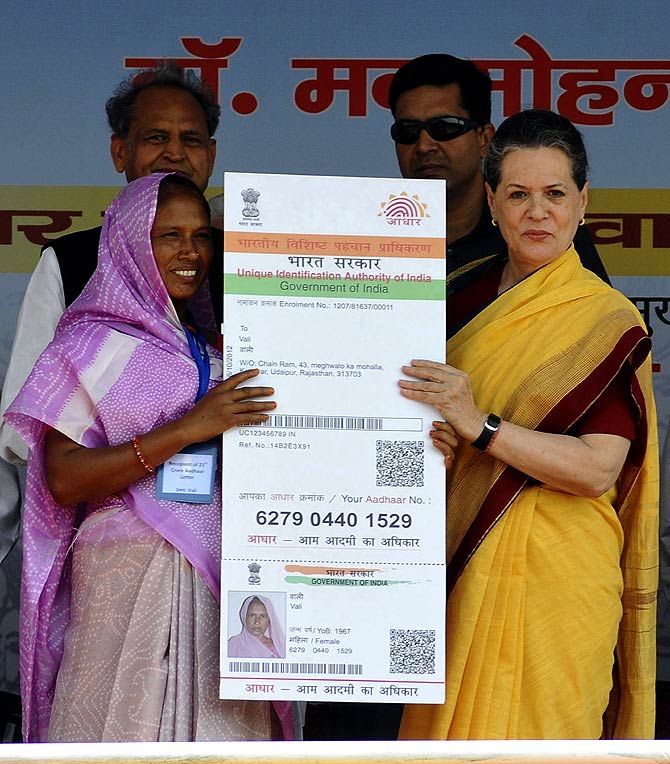 | « Back to article | Print this article |
The Congress and the Left parties might move court to challenge LS speaker's ruling on Aadhaar as money Bill.

On a day the authenticity of information on the Lok Sabha website came under a cloud, the Opposition on Wednesday embarrassed the government in the Rajya Sabha by recommending to the Lok Sabha as many as five amendments to the Aadhaar Bill.
The Lok Sabha sat till late in the evening to discuss the Bill and rejected the amendments after a walkout by several Opposition parties. The Lok Sabha passed the Bill in its original form.
It is rare in the history of Parliament for the Upper House to have recommended amendments to a money Bill.
The Aadhaar Bill was certified as a money Bill by the Lok Sabha Speaker, which meant that the Upper House could only ‘recommend’ amendments, which are not binding on the Lok Sabha. According to the Constitution, the Speaker’s veto on the issue cannot be challenged.
But, the Communist Party of India (Marxist) chief Sitaram Yechury said in the Upper House that legal avenues would be explored on the issue of the Speaker’s discretion.
Echoing similar views, Congress spokesperson Abhishek Manu Singhvi told reporters that the party could challenge the Speaker’s ruling in a court of law since “by no stretch of imagination, is the Aadhaar Bill a money Bill”.
In the discussion on the Bill, Congress member of Parliament Jairam Ramesh suggested nine amendments that primarily related to ensuring that Aadhaar is not made mandatory for seeking government entitlements, that it should not be used for any other purpose other than for identifying beneficiaries for government subsidies, and that the government should look into the recommendations by the A P Shah committee on privacy of Aadhaar data.
He also suggested the clause relating to sharing of biometric information in cases of ‘national security’ be amended considering the possibility of its misuse.
The Opposition - the Congress, the Left parties, Janata Dal (United) and other regional parties - pushed for a division of votes on five of these nine amendments.
But, such is the lack of numbers of the government in the Rajya Sabha that despite the All India Anna Dravida Munnetra Kazhagam members supporting the government on the issue and parties such as Trinamool Congress, Biju Janata Dal, Bahujan Samaj Party and Samajwadi Party staging a walkout, the government lost 76 to 64 of the 140 members voting on the amendments.
Ramesh, the former union minister for rural development, criticised the government for pushing it as a money Bill.
He said the government, by trying to bypass the scrutiny of the Upper House, was “knocking a nail in the coffin of the Rajya Sabha”.
THE FIVE CHANGES TO AADHAAR BILL
Congress member of Parliament (MP) Jairam Ramesh moved nine changes. Other MPs also moved changes.
The Opposition pushed for a division on five of Ramesh’s nine changes.
These five were incorporated in the Bill and recommended to the Lok Sabha, which later rejected all these changes
RAJYA SABHA’S FIVE CHANGES
CHANGE 1: Clause 3
An individual who does not wish to continue as a holder of Aadhaar number should be permitted to have his number deleted from the Central Identities Data Repository. A certificate shall be issued within fifteen days of the request.
CHANGE 2: Clause 7
If an Aadhaar number is not assigned to or if an individual chooses not to opt for enrolment, the person shall be offered alternate and viable means of identification for delivery of the subsidy, benefits, or service.
CHANGE 3: Clause 33
For the words “national security”, the words “public emergency or in the interest of public safety” be substituted.
CHANGE 4: Clause 33
The Oversight Committee (which will take a decision on whether to agree to a request to share biometric data of an individual for national security) should also include the central vigilance commissioner or the ‘comptroller and auditor general’.
CHANGE 5: Clause 57
This clause be deleted
Clause 57: states that “nothing contained in this Act shall prevent the use of the Aadhaar number for establishing the identity of an individual for any purpose, whether by the state or any body, company or person.”
Ramesh added that former Attorney General K Parasaran, a nominated member of the House, had a said that in its “pith and substance” Aadhaar was not a money Bill.
He also accused Finance Minister Arun Jaitley of having “manufactured” information that the previous Congress governments had pushed through such Bills as the Juvenile Justice Bill in 1986 and African Development Bill in 1983 as money Bills.
Jaitley said the source of his information was the Lok Sabha website, but Ramesh countered it by saying that the Rajya Sabha secretariat has told him that the information was incorrect and neither of the two Bills had been certified as money Bills.
Subhash C Kashyap, former secretary-general of the Lok Sabha, said he could not recall a previous instance of the Rajya Sabha having recommended amendments on a money Bill.
He also said Jaitley’s mistake was bona-fide and could not attract a privilege motion.
“The privilege motion can be moved if a member of the House has shared some information deliberately, wilfully and with a view to misleading the House. This clearly wasn’t the case as the finance minister had relied on the Lok Sabha website.”